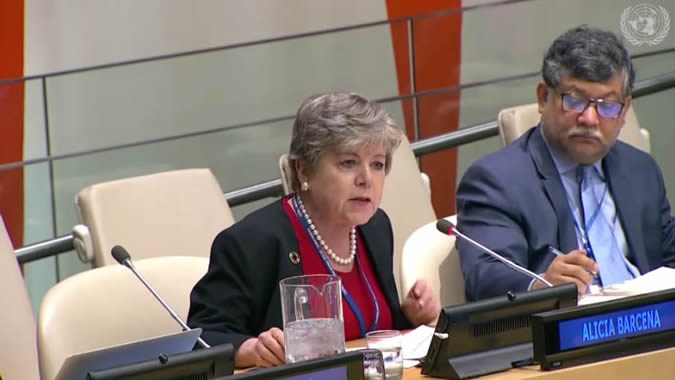ECLAC Reaffirms Importance of the Regional Dimension in Implementation of the 2030 Agenda for Sustainable Development
The organization’s Executive Secretary, Alicia Bárcena, made a presentation at a high-level meeting of the United Nations Economic and Social Council (ECOSOC) in New York.

The Executive Secretary of the Economic Commission for Latin America and the Caribbean (ECLAC), Alicia Bárcena, reaffirmed the importance of the regional dimension in the United Nations System and – particularly the role and added value provided by the UN regional commissions – in the implementation of the 2030 Agenda for Sustainable Development, during a high-level meeting held on Wednesday, May 22 at the global organization’s headquarters in New York.
The international official, in her role as coordinator of the five UN regional commissions, was one of the main panelists at the fifth session of the Operational Activities for Development Segment, of the UN Economic and Social Council (ECOSOC), which has brought together Member States and chiefs and senior representatives of the United Nations systems organizations involved in development issues from May 21 to 23, in order to evaluate the actions taken thus far on the UN development system reform, which is the most profound such process in recent decades.
This reform consists of optimizing the functioning of the UN development system and maximizing its support and contribution to member countries on implementation of the 2030 Agenda for Sustainable Development. The reform includes a renewed role for UN Resident Coordinators at a national level, who now form part of the organization’s secretariat and work under the direct supervision of the Secretary-General. In addition, the reform entails a broad review of the system’s assets, both tangible and intangible, at a regional and subregional level and identifying areas for improving integration and collective work at the service of countries.
The meeting, which was inaugurated on Tuesday, May 21 by the UN Secretary-General, António Guterres, continued on Wednesday under the direction of the entity’s Deputy Secretary-General, Amina Mohammed. During the fifth session, at a roundtable on “Maximizing impact through collective results. Getting the regional architecture right: A roundtable on the way forward,” the other speakers included Masud Bin Momen, Permanent Representative of Bangladesh to the UN; Jens Wandel, Special Adviser to the Secretary-General on Reforms; and Mourad Wahba, Assistant Administrator and Director of the Regional Bureau for Arab States of the United Nations Development Program (UNDP). The discussion was moderated by Ibrahim Mayaki – CEO of the New Partnership for Africa’s Development, former Prime Minister of Niger and former member of the Independent Team of Advisors to the ECOSOC Dialogue – and the discussant was Pieter Leenknegt, Head of Unit of Belgian Development Cooperation and Humanitarian Aid.
In her presentation in her capacity as current coordinator of the five United Nations regional commissions (for Africa, Latin America and the Caribbean, Asia and the Pacific, Western Asia and Europe), Alicia Bárcena emphasized that the regional dimension represents more than the sum of actions taken at a national level because it allows for addressing transboundary challenges such as climate change, human mobility or the impacts of the technological revolution, which necessitate shared responses and collective action. She indicated that the regional commissions act as think tanks and intergovernmental platforms that have the power to convene Member States, other national stakeholders, as well as regional entities and the UN Resident Coordinators to address the progress and challenges related to sustainable development at a regional and subregional level. They also offer studies, technical cooperation and opportunities for peer learning, based on facts, data and concrete evidence and knowledge of the regions’ own realities.
“We are convinced that the Member States of the regional commissions value and understand the importance of intergovernmental regional cooperation and integration in support of country demands and priorities as an essential dimension to complement the global level,” she indicated.
“The regional dimension offers a valuable setting for engaging Member States and other stakeholders in substantive and multidisciplinary debates on the Sustainable Development Goals (SDGs) and means of implementation in areas where regional collaboration is essential, such as integration, trade, fiscal policies, technology, migration and climate change,” Bárcena added.
In particular, Alicia Bárcena highlighted the creation of the regional forums for sustainable development, which have become the locus for peer learning regarding the preparation of voluntary national reviews, for discussing gaps and barriers to the implementation of the 2030 Agenda, and for strengthening integration between the three pillars of development (economic, social and environmental).
She also stressed that the regional commissions have become “ecosystems” of data and statistics and are repositories of economic, social and environmental information coming from national statistical systems, household surveys, population censuses and general figures from UN entities at a global, regional and country level.
“We are currently developing ‘SDG gateways’ to make available to countries and the UN system all comparable data on the progress towards reaching the SDGs; information on data gaps, capacities and readiness of national statistical systems to measure the indicators of these goals; peer learning processes in the framework of the regional meetings of the Statistical Conference of the Americas; support for the development of data ecosystems at regional and national levels, including geospatial information, big data, and so forth; and regional observatories on specific areas of SDG follow-up and implementation,” Bárcena explained.
In the case of Latin America and the Caribbean, ECLAC’s Executive Secretary cited the example of two relevant initiatives in the area of regional cooperation being carried out by this commission: the El Salvador-Guatemala-Honduras-Mexico Comprehensive Development Plan, which was unveiled two days ago and which entails a paradigm shift in the approach to the economic and social consequences of migration, moving from a focus on national security to one of human security; and the Caribbean first initiative, which seeks to address the vulnerabilities of that subregion’s small island states.
Related content
Maximizing results: getting the regional architecture right - ECOSOC operational activities for development segment, 2019
Statement by Alicia Bárcena, Executive Secretary of ECLAC, in the ECOSOC operational activities for development segment, 2019.
Maximizing impact through collective results: Getting the UNDS regional architecture right
Presentation by Alicia Bárcena, ECLAC Executive Secretary, in the ECOSOC Operational Activities Segment 2019.
Country(ies)
- Latin America and the Caribbean
